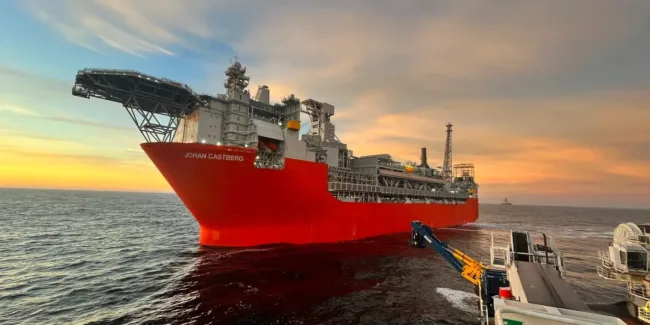Equinor and Vår Energi anchor Johan Castberg FPSO, production to start by late 2024
Equinor Energy and Vår Energi have reached a critical milestone in the development of the Johan Castberg oil field, as they confirm the successful anchoring of the floating production, storage, and offloading (FPSO) vessel in the Barents Sea. This FPSO, designed to manage oil extraction from the Johan Castberg field, is now ready for the next phase—connecting the vessel to the field’s subsea infrastructure in preparation for production, which is scheduled to begin in the final quarter of 2024.
The Johan Castberg field is set to become a significant contributor to Norway’s oil production, with Equinor and its partners, Vår Energi and Petoro, pushing forward with plans to extract up to 650m barrels of recoverable oil. The field is located approximately 100 kilometres northwest of the Snøhvit field at a depth of 370 metres, and its expected production lifespan is 30 years. At peak capacity, the field is projected to produce up to 220,000 barrels of oil per day.

Significant Progress in a Long-Awaited Project
The Johan Castberg project has been years in the making. The field consists of three key discoveries—Skrugard, Havis, and Drivis—uncovered between 2011 and 2013. While initial plans forecasted production to begin in 2022, the project has faced several delays. Market fluctuations, cost overruns, and the global impact of the Covid-19 pandemic forced the operators to push back their timeline.
Despite these challenges, progress has steadily advanced. The development plan includes drilling 30 wells across 10 subsea templates and two satellite installations, all of which will be connected to the FPSO. As of now, 13 wells have been drilled, with further drilling operations expected to continue through to 2026. The FPSO, a massive vessel measuring 313 metres long, 55 metres wide, and 120 metres high, has a design storage capacity of 1.1m barrels of oil, allowing it to play a crucial role in the collection, processing, and export of the oil.
Major Economic Impact and Rising Costs
When the development plan for the Johan Castberg field was first submitted to the Norwegian Parliament in 2017, the estimated cost stood at NOK 57 billion ($5.3 billion). However, as the project progressed, costs have risen considerably, driven by increasing expenses for marine operations, drilling, and the broader economic consequences of the Covid-19 pandemic. In 2023, Equinor, Vår Energi, and Petoro updated their investment estimate, adding an additional NOK 13 billion ($1.2 billion) to the project’s overall budget. The revised total cost now stands at NOK 80 billion ($7.55 billion).
A substantial part of this cost increase can also be attributed to currency fluctuations, with an impact of over NOK 7 billion ($660 million). Nevertheless, the partners are confident that the project will generate significant returns, both for the companies involved and for the Norwegian economy at large. The Johan Castberg field is expected to create long-term employment opportunities and generate ripple effects across various sectors.
Norway’s Role as a Reliable Energy Supplier
The successful anchoring of the FPSO and the approaching production start is not only a significant achievement for Equinor and its partners but also a strategic move for Norway’s energy sector. The Johan Castberg field is poised to reinforce the country’s role as a key supplier of oil to the global market, particularly at a time when energy security is a pressing issue for many nations. The field’s long-term production potential ensures that Norway will remain a reliable energy exporter for decades to come.
Equinor’s project management control senior vice president, Trond Bokn, highlighted the importance of this milestone, stating: “This is an important milestone for Equinor and its partners Vår Energi and Petoro. Johan Castberg strengthens Norway’s role as a reliable, long-term energy supplier. The field will create great value for society, and long-term ripple effects and jobs.”
The Way Forward for Johan Castberg
As production start-up approaches, the focus will now shift to the final phase of the development. The process of hooking up the FPSO to the subsea facilities will be the next major step. Once fully operational, the Johan Castberg field will begin delivering oil, playing a crucial role in Norway’s energy output for the next 30 years.
The FPSO will process the oil extracted from the field, allowing for efficient storage and transportation. From there, the oil will be exported to global markets, further solidifying Norway’s standing as a stable and reliable source of energy. This project is a testament to the country’s capacity for large-scale energy development, even in challenging environments like the Barents Sea.
The future of the Johan Castberg field looks promising, with both local and global implications for the energy sector. The field will not only boost Norway’s oil production but also help secure energy supplies for the future.
Discover more from Business-News-Today.com
Subscribe to get the latest posts sent to your email.